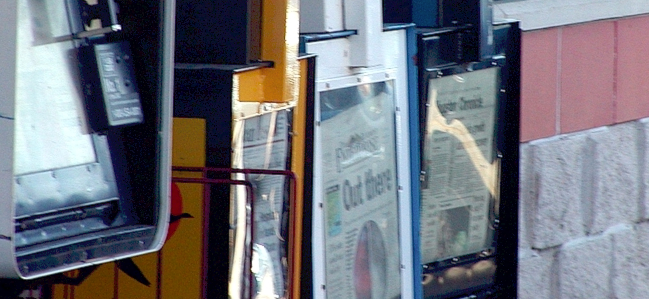Why It’s Not OK for Journalists to get Intellectual Property Law Wrong
 If you follow my Twitter account, you already know that, on a regular basis, I tweet at journalists who get facts wrong about copyright and other areas of intellectual property law.
If you follow my Twitter account, you already know that, on a regular basis, I tweet at journalists who get facts wrong about copyright and other areas of intellectual property law.
As a result, fairly regularly on my Twitter feed. I find myself doing things like Tweeting at NPR for messing up the name of the Digital Millennium Copyright Act act:
Dear @npr I think you meant “Digital Millennium Copyright Act” not “Millennium Digital Copyright Act” npr.org/blogs/alltechc…
— Jonathan Bailey (@plagiarismtoday) February 19, 2013
Rr reaching out to the San Jose Mercury News about confusing copyright and trademark:
Dear @mercnews the commercial in this article was riffing trademark issues, not copyright. Even said so in the ad. mercurynews.com/entertainment/…
— Jonathan Bailey (@plagiarismtoday) February 1, 2013
While I don’t try to Tweet about every copyright mistake I see in the mainstream media, such a task would be a full-time job, I at least try to address the more major ones and, even then, it feels like I’m sending out such Tweets on a weekly basis.
But it’s not just about Twitter. Back in October I created a guide on copyright, trademark and patents for journalists covering the topic and I’ve also sent emails and left Facebook comments from time to time.
But some wonder why this bothers me so much? After all, journalists aren’t all experts in intellectual property law and mistakes are bound to happen.
However, it’s not so simple. Journalists play a key role in the intellectual property debates taking place and the inability of some to get even basic facts right risks causing confusion and stifling the debate.
It’s no longer acceptable for journalists to not understand copyright and intellectual property (if it ever was) and the reasons for that are quite simple.
Reason 1: Intellectual Property is Every Journalists’ Business
While it’s true not every reporter is an expert on intellectual property or reports on it at all, it is true that every reporter is in the intellectual property business.
Whether in print, video or radio, a journalist is creating copyrighted works that are distributed with the hopes of making money. Those works are backed by the reputation of trademark-protected names and slogans that instil a sense of confidence in the work and help motivate the public to consume it.
Furthermore, journalists are in the business of using works protected by intellectual property law. Whether it’s pulling quotes from a book, talking about a brand or licensing photos, knowing the basics of what the law says not only helps you do your job with less legal risk but it also helps you flex all of your rights.
In short, every journalist is creating and using copyrighted works, making it important to have at least a basic understanding of the law.
2. Journalist Mistakes have a Big Impact
Mainstream media outlets, especially at large publications, are still trusted sources of information (despite an apparent lack of trust in journalists themselves). Most people don’t turn to blogs or niche sites dedicated to the issues around intellectual property. Instead, they get what they need to know from more traditional news outlets, whether they are reading them online or off.
If journalists repeatedly make mistakes on the topic, others will accept those mistakes and even cite the news report as a source when challenged on it. In short, journalists that get basic facts wrong give credibility to those falsehoods and that hurts the quality of the dialog on these issues, which often wastes as much time trying to establish basic facts as talking about the challenges.
Reason 3: It’s About the Internet
Intellectual Property Law, in particular copyright, is going to play a big part of the future of the Internet. The Internet, in turn, is the future of journalism. If journalists are going to understand the future of their field, they need to understand the rules that will be shaping it.
Not doing so is akin to stepping onto a basketball court with no understanding of what the lines or baskets mean. If one does not know the rules of the game, they’re just going to be in the way when they try to play it.
A big part of preparing journalists for the next phase of the industry is going to be making sure they’re up to speed on the Internet and part of that means knowing at least the basics of intellectual property law.
Bottom Line
To be clear, I don’t jump on everything that I see as a mistake. Penty of times I disagree with what a journalist printed or think that something could have been said better, but I say nothing.
Instead, I focus on the big mistakes, the errors are both provably wrong and would never have happened either with a rudimentary understanding of the law or a simple fact check.
I don’t expect journalists to be experts on copyright, trademark and patent law but I do expect them to know at least a bit more than most people. This area of law is their business and their future. If they want to take their place in the debates on these issues, getting their basic facts right is a good start.
So I don’t think it’s too much to ask that journalists spend some time brushing up on their intellectual property law. It’s part of every journalism college and, whether you realize it or not, is a daily part of your job.
I’m not asking for much. I’d be happy if everyone just knew the difference between trademark and copyright.
Want to Reuse or Republish this Content?
If you want to feature this article in your site, classroom or elsewhere, just let us know! We usually grant permission within 24 hours.
